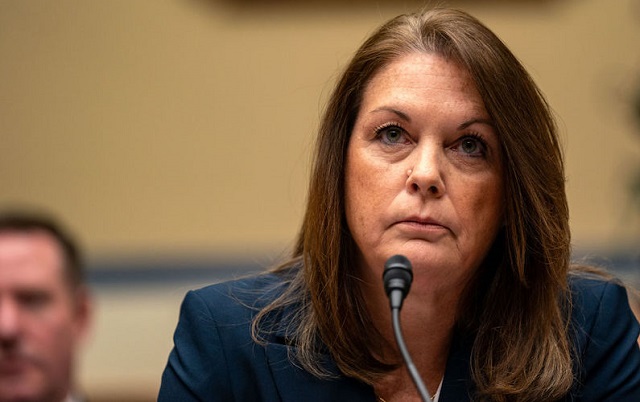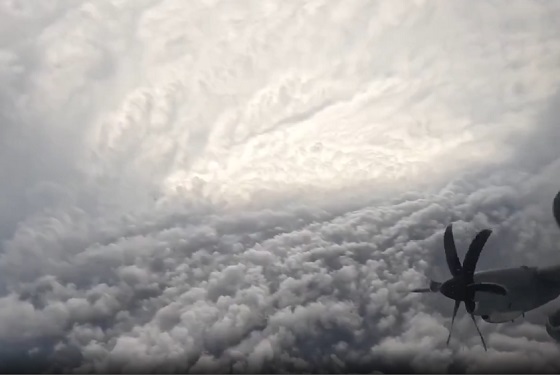International
Secret Service Director Kimberly Cheatle resigns after major backlash over Trump assassination attempt

United Sates Secret Service Director Kimberly Cheatle testifies before the House Oversight and Accountability Committee during a hearing at the Rayburn House Office Building on July 22, 2024 in Washington, DC.
Kent Nishimura/Getty Images
From LifeSiteNews
Secret Service Director Kimberly Cheatle has finally announced she will step down after being roundly slammed by a bipartisan committee during a congressional hearing for her failure to prevent the assassination attempt on Donald Trump.
U.S. Secret Service Director Kimberly Cheatle has stepped down amid resounding, bipartisan calls for her resignation by congressmen following the assassination attempt on former President Donald Trump.
Three sources confirmed to NBC that Cheatle officially resigned on Tuesday morning. In her letter of resignation, shared by a senior official, Cheatle wrote that she takes “full responsibility for the security lapse.”
“In light of recent events, it is with a heavy heart that I have made the difficult decision to step down as your Director,” she wrote.
President Joe Biden said in a statement following Cheatle’s announcement of her resignation that he will appoint a new head of Secret Service “soon.” He has ordered an “independent review” to investigate the day’s events.
In response to Cheatle’s resignation, Trump wrote on Truth Social: “The Biden/Harris Administration did not properly protect me, and I was forced to take a bullet for Democracy. IT WAS MY GREAT HONOR TO DO SO!”
Her decision comes a day after being grilled under subpoena by Republican and Democrat members of the House Oversight Committee, who ripped her both for the grave Secret Service lapse that allowed Trump to be shot and for her refusal to answer simple questions during the hearing.
The leading Democrat member of the panel, Rep. Jamie Raskin (D-Md.), accused Cheatle of having “lost the confidence of Congress at a very urgent and tender moment in the history of the country.”
Rep. Nancy Mace (R-S.C.) slammed Cheatle as “full of s***” and “completely dishonest” for not giving direct answers to questions, including about providing “audio and video recordings” in her possession that were taken the day of the Trump assassination attempt.
“How did a 20-year-old loner with a week’s notice pick the absolute best location to assassinate President Trump when the entire Secret Service missed it?” asked Rep. Pat Fallon, R-Texas. “Director Cheatle, on your leadership, your agency got outsmarted and outmaneuvered by a 20-year-old. How can we have any confidence that you could stop trained professionals from a nefarious nation state?”
The Secret Service director was unable to provide explanations as to why the roof used by Crooks to shoot at Trump was not secured the day of the shooting and why Trump was allowed to speak on stage while the Secret Service was aware that a suspicious man was present on the grounds that day. At one point, she claimed she did not “have the timeline of how the individual accessed the roof, where they accessed the roof, or how long they were on the roof.”
She said, however, that all the security resources requested “for that day” were provided.
Cheatle resisted calls to resign prior to Tuesday, with a Secret Service spokesperson declaring last week that she had no intention to resign even after mounting calls for her to step down.
Critics across the board have described the security breach at Trump’s Pennsylvania campaign rally as a “catastrophic failure” of the Secret Service. Video footage emerged online of attendees from the Trump rally alerting police to the gunman, 20-year-old Thomas Matthew Crooks, positioned on a roof toward the rally stage, highlighting one of many security failures that day to prevent the assassination attempt. One man present that day told the BBC he was “pointing” at the gunman on the roof for two or three minutes.
Counter-snipers fatally shot Crooks after one of his shots grazed the former president’s right ear, bloodying him. However, Crooks killed a rally attendee, identified as 50-year old Corey Comperatore, a former fire chief. Two other Pennsylvania residents were shot, but are reportedly in stable condition.
International
Strongest hurricane in 174 years makes landfall in Jamaica

Hurricane Melissa slammed into Jamaica on Tuesday morning as a ferocious Category 5 storm, becoming the most powerful system ever to strike the island in 174 years of recordkeeping. The eye of the hurricane made landfall near St. Elizabeth Parish on the southern coast, bringing catastrophic winds, torrential rain, and life-threatening storm surges before beginning its projected path across the island toward St. Ann Parish in the north.
The storm had already proven deadly across the Caribbean, blamed for at least seven deaths—three in Jamaica, three in Haiti, and one in the Dominican Republic—while another person remains missing. Even before landfall, landslides, uprooted trees, and widespread blackouts had been reported, with emergency officials warning that the full scope of destruction may take days to assess.
Witness the raw power of nature as a U.S. Air Force pilot navigates through the eye wall of Hurricane Melissa, a Category 5 storm with 185 mph winds sweeping across Jamaica, Haiti, and the Dominican Republic. The accompanying image captures the storm's mesmerizing eye, where life… pic.twitter.com/JtKMOyJ4ku
— SanaviNet (@Sanavi1009) October 28, 2025
According to the Associated Press, Prime Minister Andrew Holness said the government had done all it could to prepare but admitted the storm’s intensity would test Jamaica’s limits. “There is no infrastructure in the region that can withstand a Category 5,” Holness said. “The question now is the speed of recovery. That’s the challenge.”
Forecasters warned of storm surges up to 13 feet along Jamaica’s southern coast, threatening homes, hospitals, and infrastructure. Health Minister Christopher Tufton said some patients were moved to upper floors as a precaution. “We hope that will suffice for any surge that will take place,” Tufton told reporters.
🚨 BREAKING: HOSPITALS DESTROYED IN JAMAICA 🚨
Medical facilities in Black River, Jamaica have reportedly been destroyed, according to a Jamaican Senator speaking to NBC.
Amid Hurricane Melissa’s catastrophic landfall, emergency services are overwhelmed, and access to care is… pic.twitter.com/FwJsmfMvqr— Dj Steven King (@djstevenking1) October 28, 2025
Matthew Samuda, Jamaica’s Minister of Water, Environment, and Climate Change, called the situation “frightening,” noting that roughly 70 percent of the country’s population lives within three miles of the sea. Low-lying communities such as Kingston, Old Harbour Bay, Rocky Point, and St. Elizabeth were expected to bear the brunt of the flooding.
“We hope we have done enough in terms of preparation,” Samuda said in an interview with the BBC, urging residents to seek shelter and pleading with Jamaicans abroad to call loved ones “before it’s too late.” Still, officials acknowledged that many have refused to leave their homes, choosing to guard their property instead.
As Melissa churns across the island, authorities warn that the coming hours will be critical. The storm’s powerful winds and deluge threaten to cut off entire communities, with the recovery effort expected to be long and grueling once skies finally clear.
Business
Canada has given $109 million to Communist China for ‘sustainable development’ since 2015

From LifeSiteNews
A briefing note showed Canadian aid has gone to ‘key foreign policy priorities in China, including human rights, gender equality, sustainable development, and climate change.’
A federal briefing note disclosed that well over $100 million has been provided to the Communist Chinese government in so-called “foreign aid” to promote “sustainable development” that includes woke ideology such as gender equality.
As reported by Blacklock’s Reporter, a recent briefing note titled Assistance to China from May for the Minister of International Development showed $109 million has gone to “key foreign policy priorities in China, including human rights, gender equality, sustainable development, and climate change” since 2015 and $645 million since 2003.
The briefing note asked directly if funding was “going to the Government of China.”
In reply, the briefing note stated, “Canada has not provided direct bilateral assistance to Chinese state authorities since 2013, though it continues to provide small amounts of funding to international partners and non-state partners on the ground.”
Former Prime Minister Justin Trudeau came to power in 2015 and increased relations with the Communist Chinese regime. This trend under the Liberal Party government has continued with Prime Minister Mark Carney.
During a 2025 federal election campaign debate, Conservative Party leader Pierre Poilievre called out Carney for his ties to Communist China.
Conservative MP Andrew Scheer has consistently called out any money at all going to China, saying, “I don’t believe Canadian taxpayers should be sending any money to China.”
“We’re talking about a Communist dictatorial government that abuses human rights, quashes freedoms, violates rights of its citizens, and has a very aggressive foreign policy throughout the region,” he noted.
Scheer added that he has been calling on the Carney Liberals to “stand up for themselves, stand up for Canadians, stop being bullied and pushed around on the world stage, especially by China.”
Most of the money in foreign aid was spent through globalist-backed agencies such as the World Bank and the United Nations Development Program. Some 39 percent of the money was said to have gone straight to Chinese recipients, but no projects were itemized.
Other countries have received millions of dollars in foreign aid, with $2.1 billion going to Ukraine, $195 million to Ethiopia, $172 million to Haiti, and $151 million to the West Bank and Gaza last year.
Foreign aid to all nations totaled $12.3 billion.
LifeSiteNews recently reported that the Canadian Liberal government gave millions in aid to Chinese universities.
China has been accused of direct election meddling in Canada, as reported by LifeSiteNews.
LifeSiteNews also reported that a new exposé by investigative journalist Sam Cooper has claimed there is compelling evidence that Carney and Trudeau are/were strongly influenced by an “elite network” of foreign actors, including those with ties to China and the World Economic Forum.
-

 Business18 hours ago
Business18 hours agoTrans Mountain executive says it’s time to fix the system, expand access, and think like a nation builder
-

 Alberta2 days ago
Alberta2 days agoCoutts border officers seize 77 KG of cocaine in commercial truck entering Canada – Street value of $7 Million
-

 Business2 days ago
Business2 days agoThe painful return of food inflation exposes Canada’s trade failures
-

 Alberta1 day ago
Alberta1 day agoPremier Smith sending teachers back to school and setting up classroom complexity task force
-

 Alberta1 day ago
Alberta1 day agoThousands of Albertans march to demand independence from Canada
-

 Addictions20 hours ago
Addictions20 hours agoThe Shaky Science Behind Harm Reduction and Pediatric Gender Medicine
-

 Business2 days ago
Business2 days agoCBC uses tax dollars to hire more bureaucrats, fewer journalists
-

 Business2 days ago
Business2 days agoOttawa Bought Jobs That Disappeared: Paying for Trudeau’s EV Gamble









